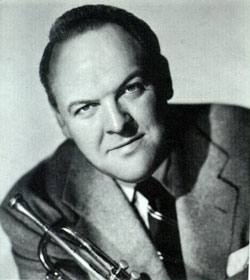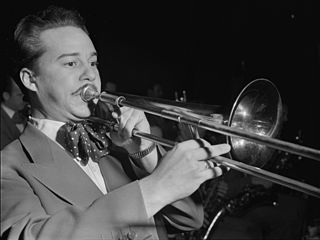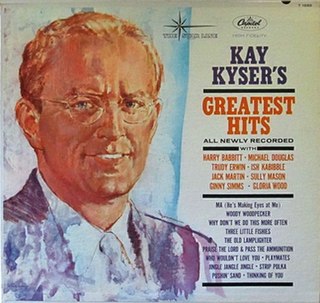Swing music is a style of jazz that developed in the United States during the late 1920s and early '30s. It became nationally popular from the mid-1930s. The name derived from its emphasis on the off-beat, or nominally weaker beat. Swing bands usually featured soloists who would improvise on the melody over the arrangement. The danceable swing style of big bands and bandleaders such as Benny Goodman was the dominant form of American popular music from 1935 to 1946, known as the swing era, when people were dancing the Lindy Hop. The verb "to swing" is also used as a term of praise for playing that has a strong groove or drive. Musicians of the swing era include Duke Ellington, Benny Goodman, Count Basie, Cab Calloway, Benny Carter, Jimmy Dorsey, Tommy Dorsey, Woody Herman, Earl Hines, Harry James, Lionel Hampton, Glenn Miller, Artie Shaw, Jimmie Lunceford, and Django Reinhardt.

Edward William May Jr. was an American composer, arranger and trumpeter. He composed film and television music for The Green Hornet (1966), The Mod Squad (1968), Batman, and Naked City (1960). He collaborated on films such as Pennies from Heaven (1981), and orchestrated Cocoon, and Cocoon: The Return, among others.

George Mortimer Roberts was an American trombonist.
"Memories of You" is a popular song about nostalgia with lyrics written by Andy Razaf and music composed by Eubie Blake and published in 1930.

Austin Dean "Bud" Brisbois was a jazz and studio trumpeter. He played jazz, pop, rock, country, Motown, and classical music.
Gene M. Roland was an American jazz composer and musician. He played many instruments during his career, but was most significant as an arranger/composer and for his association with Stan Kenton. Roland was one of only two arrangers to write for Kenton, in all four decades of the band's existence, the other being Ken Hanna.

Milt Bernhart was a West Coast jazz trombonist who worked with Stan Kenton, Frank Sinatra, and others. He supplied the solo in the middle of Sinatra's 1956 recording of I've Got You Under My Skin conducted by Nelson Riddle.

Samuel Koontz Donahue was an American jazz saxophonist, trumpeter, and musical arranger. He performed with Gene Krupa, Tommy Dorsey, Benny Goodman, Billy May, Woody Herman, and Stan Kenton.

Edward Joseph Bertolatus, also known as Eddie Bert, was an American jazz trombonist.
Joe Comfort was an American jazz double bassist.

Jack James Costanzo was an American percussionist.
"I Got It Bad (and That Ain't Good)" is a pop and jazz standard with music by Duke Ellington and lyrics by Paul Francis Webster published in 1941. It was introduced in the musical revue Jump for Joy by Ivie Anderson, who also provided the vocals for Duke Ellington and His Orchestra on the single Victor 27531. Recordings to reach the Billboard charts in 1941/42 were by Duke Ellington (#13) and by Benny Goodman (vocal by Peggy Lee) (#25).
Alvin Stoller was an American jazz drummer. Though he seems to have been largely forgotten, he was held in high regard in the 1940s and 1950s. He was best known for playing drums on both Mitch Miller's recording of "The Yellow Rose of Texas" and Stan Freberg's parody of Miller's recording.
Donald John Sebesky was an American composer, arranger, conductor, and jazz trombonist. He was a multi-instrumentalist and could play a number of other instruments: keyboards, electric piano, organ, accordion, and clavinet.
Chronological Classics was a French compact disc reissue label. Gilles Pétard, the original owner, intended to release the complete master takes of all jazz and swing recordings that were issued on 78 rpm. By the time the label suspended operations in July 2008, its scope had extended to LPs.
Hindsight Records is an American record label that specializes in issuing previously unreleased radio broadcast recordings of Big Bands and Jazz artists.

Ellington '55 is an album by American pianist, composer and bandleader Duke Ellington recorded for the Capitol label in 1953 and 1954 and released in 1955. The album features the Ellington Orchestra's performances of popular big band compositions and was reissued on CD with two bonus tracks in 1999.

Road Show is a live album by bandleader and pianist Stan Kenton and His Orchestra with vocalists June Christy and The Four Freshmen featuring a concert recorded at the Purdue University in 1959 and released on the Capitol label as a double album.
The Big Band and Jazz Hall of Fame is part of a US-based non-profit organization that began operations in 1978 and continues to the present (2022) in San Diego County, California. David Larkin is current president.

Kay Kyser's Greatest Hits is a 1962 compilation album featuring music made famous by American bandleader Kay Kyser released by Capitol Records. While Kyser himself was not present at the recording session, former members of his orchestra Harry Babbitt, Mike Douglas, Trudy Erwin, Ish Kabibble, Jack Martin, Sully Mason, Ginny Simms, and Gloria Wood reunited to make re-recordings of their original Columbia Records hits.










